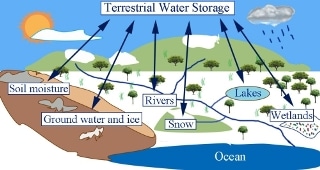Mar 22 2019
Terrestrial water storage (TWS) comprises of all phases of water above land (for example, surface and groundwater, snow etc.) and serves as a vital source of fresh water.
 Terrestrial water storage and its components (Image credit: Enda Zhu)
Terrestrial water storage and its components (Image credit: Enda Zhu)
It is an essential constituent of the terrestrial water cycle, hence a reliable TWS decadal prediction would be helpful for sustainable water resources management, particularly in a changing climate.
Hydrological predictability mainly comes from two sources: the memory in initial hydrological conditions and the predictability of boundary meteorological forcings. Scientists have been debating whether more efforts should be devoted to improving the accuracy of initial hydrological conditions or to decadal climate forecasts. And we still don’t know the TWS baseline forecast skill that considers the dynamical forecast skill from the state-of-the-art climate models.
YUAN Xing, Professor, Institute of Atmospheric Physics, Chinese Academy of Sciences
YUAN describes the objectives of his newly published study in Nature Communications
YUAN and his PhD student ZHU Enda offer a new viewpoint to handle these problems. They discovered that inclusion of the existing decadal climate prediction would considerably enhance the baseline skill of TWS prediction around over 25% worldwide major river basins at 1–4 years lead, and up to 47% river basins at 7–10 years lead.
They conducted 2200-year global land surface hydrological ensemble simulations and used a skill elasticity framework to examine the effects that the two predictability sources with different degrees of uncertainties have on the TWS decadal predictability over 32 global major river basins. Moreover, they achieved a new TWS benchmark skill by taking into account decadal climate prediction skill with the elasticity framework, which is “a new norm to assess whether different strategies for future upgrades in the climate-hydrology approach are beneficial for decadal hydrological prediction”, stated one of the reviewers of the paper.
The result proposes that enhancing observation to decrease the uncertainty of initial hydrological conditions is an effective method to optimize TWS prediction over arid and semiarid regions at 1–4 years lead. However, with the development of lead time, increasing accuracy of boundary conditions slowly plays an important role in the enhancement of TWS decadal prediction. When compared to the skill from the conventional hydrological forecast based on the initial memory, the new benchmark skill is considerably higher over 25% basins at 1–4 years lead, and up to 47% basins at 7–10 years lead.
The benchmark skill estimated in our study can be regarded as a new reference for verifying the usefulness of decadal hydrological forecasts, regardless of using complicated dynamical or statistical downscaling approaches. This paper analyzed TWS decadal predictability and benchmark skill, but it can be applied to other hydrological variables (for example, streamflow, soil moisture) from sub-seasonal to decadal time scales.
YUAN Xing, Professor, Institute of Atmospheric Physics, Chinese Academy of Sciences.
Source: http://english.iap.cas.cn/